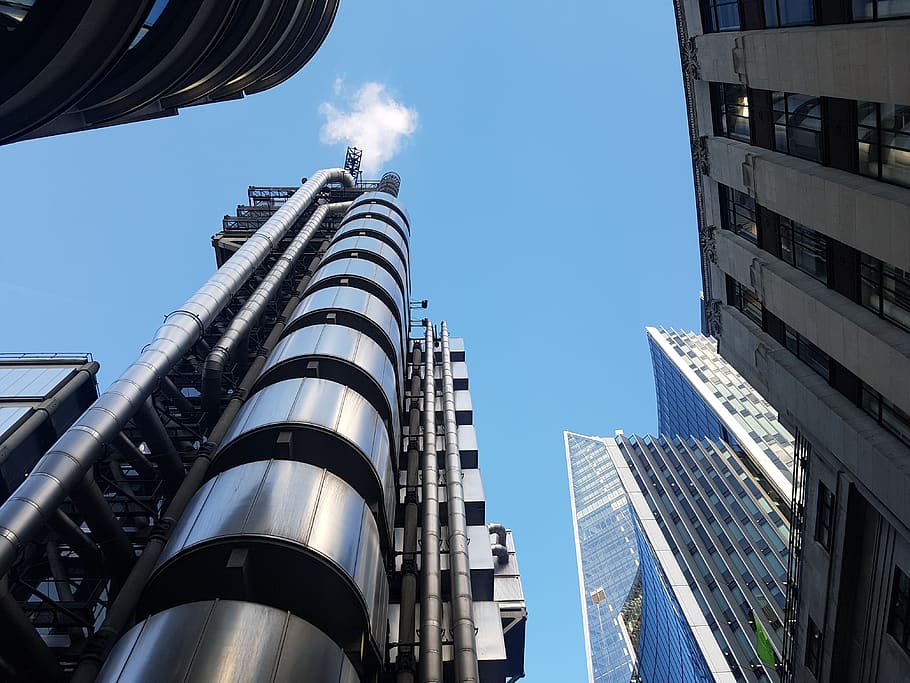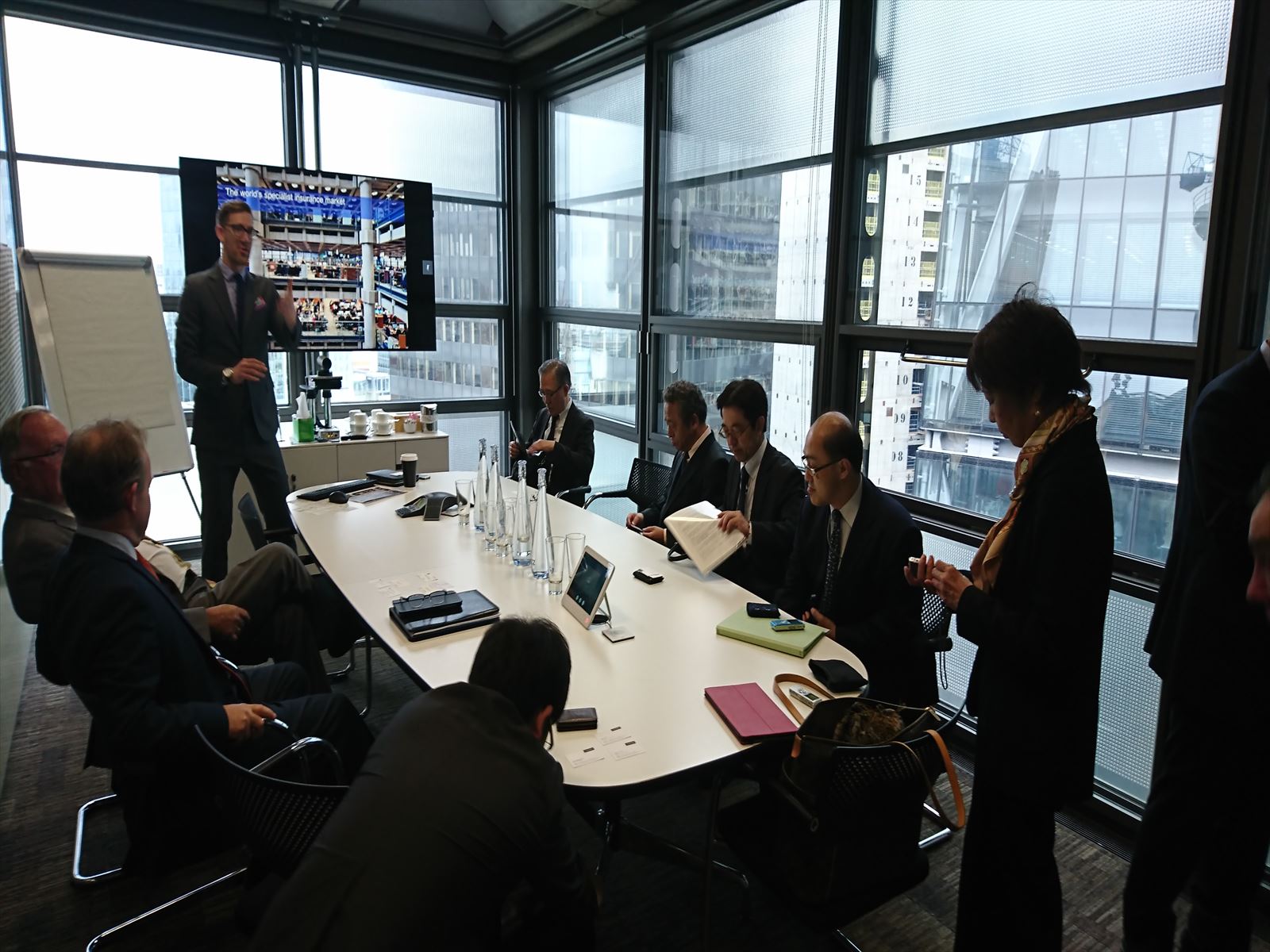企業戦略 2023.06.02
CS35 「ロイズのアンダーライター」になる
For those who prefer to read this column in English, the Japanese text is followed by a British English translation, so please scroll down to the bottom of the Japanese text.
大学を出て就職したのは、米国ニューヨークに本社を置く損害保険会社であった。何故か、「英語の筆記試験の成績が良かった」と役員面接の時に言われたが、「まさかの出来事」が起きてしまった。英語がほとんど、いや全くと言っていいほど話せなかったにもかかわらず、部長が米国人、筆者以外全員英語がペラペラ、そんな国際部に配属されてしまったのである。
国際部では、新入社員にもかかわらずタイプライターを叩いてくれる英語に堪能な「秘書」と一緒に仕事をする、「映画で見る海外の企業の姿」そのもので、訪れてくるお客様が皆さんその有り様に驚く「外資系のなかの外資系」、それまでの生活とは全く別世界に入ったような感覚にとらわれたものである。
「1年間は好きなことやっていいから、来年大きなビジネスを獲得するように」と言われた。毎日「誰もビジネスにすることができなかった多くの保険が記された古いファイル」を何冊も見て「何か良いビジネスを創ることはできないか」と、1年間必死に取り組んだ。幸い、素晴らしいお客様に恵まれ、上司の期待を遙かに超えニューヨーク本社の役員も驚くような、新しい大きなビジネスを獲得することができた。
「ご褒美」を兼ねて与えられたのが、社内の誰もが憧れた3ヶ月間のニューヨーク本社での研修であった。しかし、「英語が話せなかった筆者」にとっては「地獄のご褒美」であった。
辞書を片手に片言の英語を「駆使」して必死に学んだ。そのおかげで、取引信用保険、輸出取引信用保険、政治危険保険等を扱う研修先の部門では、40年経った今でも親しく付き合っている友人や上司に恵まれ、極めて異例のことであったが、同部門から「(日本)支店の社員としては上級役員しか与えられない、本社の役職(タイトル)と本社の引受権限」が与えられた。
それを聞いた日本の社長(支社長)や役員は皆さん驚天動地だったようだが、「よし、頑張れ」と肩を叩いてくれ、「ニューヨーク本社の引受権限を有するアンダーライター及び極東地域担当部長」となった。良い会社であった。ただ、いくら外資系とは言え、20代の若さで、日本人が、ニューヨーク本社部門のスタッフとして日本全域を管掌する責任を担うのは、異例中の異例の出来事であった。
以降、このニューヨーク本社の職責を担いながら、日本の役職では、課長、部長としての職責を併せて担っていった。そのため、他の部門に配属された新入社員と異なり、ニューヨーク他、米国で研修を受ける機会が多く与えられた。その後転職した、世界最大級の保険コングロマリット、CIGNAでも、本社、米国東部フィラデルフィアで勤務した。
こういう背景からか、損害保険のルーツや世界の再保険が取引されている中心地が英国ロンドンであることは無論知っていたが、英国やロイズに憧れや馴染みを持つことは全くなかった。それが大きく変わったのは、1995年7月CIGNAフィラデルフィア本社からロンドンへ3ヶ月間「ロイズのアンダーライター研修」に派遣された時であった。
1.ロイズ(Lloyd’s of London)の「地獄の特訓」
毎朝、地下鉄に乗りロイズ近くにあったCIGNAのロンドンオフィスに出社した。午前11時からロイズの2階(1階をグラウンド・フロアと呼び2階をファーストフロア(1階)と呼ぶので、日本では3階にあたる)のカンパニー・マーケット(世界の名だたる損害保険会社がシンジケートを設立すること無く、保険会社そのものとして保険を引受ける場所)にあったCIGNAのボックス(引受場所)に行き、先輩のシニア・アンダーライターから「地獄の特訓」を受けながら、「ロイズのアンダーライター」見習いとして、3ヶ月間企業保険分野全商品の引受業務をみっちり学んだのである。
初日、12時になっても誰もランチに行かないので、「どうしてかな・・」と思っていたら、午後1時頃からみんなそそくさとランチへ。後に、「シティのランチは午後1時スタート」ということを知った。顧客やブローカーとのランチ・ミーティングで、一般的なレストランに行くこともあったが、むしろブローカー達が好む「パブ」の方がランチの場所としては多かった。
ニューヨークやフィラデルフィアでは、「急ぎのランチ」をとることしかなかった筆者にとって、午後1時からたっぷり2時間、午後3時までゆったりとランチをとり、それからロイズに戻り、午後4時頃まで仕事をすることは驚きであった。「こんなにも時の流れがゆったりしているのか」と感じたものである。その後、CIGNAの事務所に戻って5時まで仕事。それからまたみんなとパブへという生活は、”英国では、保険が産業として社会から尊敬されているからできること”、そんなことを感じさせられた時期であった。
ただ、「地獄のご褒美」や「ロイズでの地獄の特訓」が、後年、財閥系生命保険会社から損害保険事業の経営コンサルティングを委嘱された際にどれほど役立ったのか解らない。人生というものは「何が後で役に立つか解らない」ものである。
周防(現在の山口県)に生まれた幕末の僧、月性(げっしょう) の言葉、「人間到る所青山あり」(じんかんいたるところせいざんあり)の言葉どおり、経営コンサルティングの委嘱を受けた財閥系生命保険会社の損害保険子会社、その商品開発をおこない、ロイズ(Lloyd’s of London)のシンジケートと会社役員賠償責任保険(D&O保険)の再保険契約(「International Non-Marine Line Slip Agreement」)を結んだ際、以下の一文が追記されていたからである。
Sub-section 3.2
THE PERSON(S) AUTHORIZED TO EXERCISE THE AUTHORITY TO QUOTE & BIND REINSURANCES:
Subject to secondary sign off by Shinichiro Hatani
つまり、「この再保険契約書が効力を有する(保険引受をおこない再保険を出再する)ためには、羽谷信一郎のサインがなければならない」ということであり、「自分たち、ロイズのシンジケート、アンダーライターは貴社の引受能力を評価するから再保険を引受けるのではなく、羽谷信一郎のアンダーライティング能力に再保険を提供するのである」という意思表明だったからである。
この一文は「ロイズ のシンジケートから引受権限が筆者に授与された」ということであり、「引受権限の授与ってことは、羽谷さんが『ロイズのアンダーライター』になったということですね」と経営コンサルティング先の社長に言われて、「ああ、そうか」と「地獄のご褒美」や「ロイズでの地獄の特訓」を受けておいて本当に良かったとしみじみ思ったことを思い出す出来事であった。
2.保険市場としての「ロイズ」(Lloyd’s of London)
1997年、財閥系生命保険会社から損害保険事業の経営コンサルティングを委嘱されたが、その時から筆者は所謂「リモート・ワーク」をおこなっていた。
コンサルティング先の会社には立派な事務所もデスクも用意されていたが、ほとんど使うことは無かった。欧米との連絡の必要性から、夜遅く、また朝早くからの連絡、対応が毎日不可欠であり、自宅書斎が「会社事務所」とならざるを得ない仕事であったからである。
損害保険の引受に関しては、再保険先の引受判断が非常に重要な役割を果たす。その再保険先はロイズを中心にしたロンドン・マーケット。これは世界中どこの損害保険会社でも同じである。サマータイムである今は、日本で仕事が一段落して終業する午後5時がロンドンでは午前9時、今年は10月29日であるサマータイムの終了後は、日本時間の午後6時がロンドンでは午前9時となる。
ロイズ(Lloyd’s of London)のシンジケート、世界中の保険会社がロンドンに置く支店、現地法人、これら「マーケット」もロイズ近くに構えている事務所での始業は午前9時であるが、ロイズの市場が開く、つまりはロイズの各ボックス(アンダーライター達が「店」を構える場所)がオープンするのは午前11時頃が一般的である。
冒頭記したとおり、午後1時からのランチ(昼食)までの2時間が「午前の市場」である。この時間帯にアンダーライターをつかまえて話しておくことがどれほど重要か、後述の理由で、ベテランのブローカーであればみんな知っている。ランチから帰ってくるのは午後3時、「午後の市場」が開くまでのこの2時間がランチの時間である。日本と違って、ビジネスの会食会、接待に夜の時間が使われることはほとんど無く、「ランチがビジネス会食の時間帯」のため、「たっぷり時間を割いている」のである。
アンダーライターが午後3時に戻ってこないことも実に多い。ランチは「ブローカー(保険仲立人)とアンダーライター」のビジネス会食の場であり、「2時間の時間では話し尽くせない場合(ビジネスチャンスがお互いに大いに有る場合)」は、場所をパブに移すことも頻繁におこなわれている。
筆者も経営コンサルタントをしていた13年間、毎年2ヶ月に1回、年6回ロンドンに出張していたが、ランチから延々ディナーまでの時間をアンダーライターと過ごしたことは数え切れないほどある。それが重要なのである。「アンダーライターの時間を如何に自分に、自分の会社に割かせるか」、これが「ロンドン・マーケットでの勝利の方程式」と言っても過言ではない。
そうなると、自分がロンドンにいれば良いが、日本にいると逆に困ったことになる。業務提携先のロンドンのブローカーに連絡を入れても、返事が返ってくるのは往々にして日本時間では夜中となるからである。それを夜中、もしくは翌朝早くから、経営コンサルティング先のスタッフが午前9時に出社するまでの間に、「その日に的確に動けるようにアドバイスを入れておく必要があった」ため、睡眠時間が削られることが多かったことを憶えている。
コンサルティング先のスタッフが朝出社、その日動いて、その結果をもって筆者に助言を求めてくることがほとんど毎日であった。「1日24時間」では、当然使える時間が限られている。「リモート・ワーク」でなければ、業務を遂行していくことは不可能であった。したがって、コンサルティング先の事務所には、それらの結果を詳細に検討、打ち合わせをする必要がある場合にだけ出社していた。それが「最も効率的なビジネスの進め方であったから」である。
グローバル・リンクを創業して以降も同様である。「米国ハワイ」にキャプティブを設立する、そのキャプティブからのリスクヘッジ先、再保険先は「英国ロンドン」である。常にロンドンの時間を気にしながら仕事をしている。都心にグローバル・リンクは事務所を構えているが、コロナ禍のためこの3年半出社したことは無く、今後も「リモート・ワーク」は続けていこうと考えている。それだけ利便性のある仕組みであり、どうしても、「それが必要な時間帯で仕事をしている」からである。
3.生き残る生物・組織
「種の起源」(「進化論」)で有名なチャールズ・ダーウィンは、「この世に生き残る生物は、最も強いものではなく、最も知性の高いものでもなく、最も変化に対応できるものである」という考えを示したと言われている。しかし、実のところ、「種の起源」にこの言葉はなく、「後世の創作」と言われているが、企業経営においてこれほど重要な言葉はないであろう。
かつて、「販売の王様」だった百貨店や大型スーパー・マーケットは、その座をコンビニに譲り、そのコンビニも、いまその座をインターネット通販に譲ろうとしている。そういう過程でコンビニが「企業の生存戦略」として導き出したのが、「コンビニからの脱皮」である。
あるコンビニは、淹れたての新鮮なコーヒーを店のなかで飲ませる仕組みをつくり、「喫茶店でコーヒーを飲む顧客層」を自社の市場に取り込んでいる。また同様に、「お弁当」、「スイーツ」と、従来の「どこでも売っている商品を何時でも開いていて、家の近くで買える店」というビジネスモデルから大きく転換して、「新しい業態」を構築していると言っても過言ではない。「どこでも売っている商品だけの販売」であれば、インターネット通販に利便性の点で敗退してしまうからである。
企業の事業リスクを分析して対応策を決めていくのが「リスクマネジメント」である。「場所としての会社事務所」という存在を含めて、今般のコロナ禍への対応から、「会社という存在」に対して非常に大きな変化を求める動きが起きている。この時代の変化に対応できるか否かによって、「その企業の存続時間」が決まると言えるであろう。誰が、どの企業が「ダーウィンのお眼鏡にかなう」のか、それは「リスクマネジメントに対する真剣度合いによって決まる」と言えるのではないだろうか。
4.損害保険業界のイノベーション
どんな業種でも、時代の推移、変遷、市場の変化に応じて、この「既存領域からの脱皮(イノベーション)」が必要になる。例え、損害保険業界であってもそうだろう。これまでキャプティブに関して、日本の損害保険会社の大半は「否定的な見方=優良な契約が逃げていくという見方」をしていたが、もはや世界の常識はそれを許さなくなっている。
損害保険業界にも「ブレークスルー」が必要である。旧来の見方しかできない「アンシャンレジーム(旧秩序)」の損害保険会社は、筆者が米国フィラデフィアで勤務した、米国最古・当時世界最大の保険会社のようになるであろう。「歴史の彼方に消えていく存在」に間違いなくなっていく。
しかし、此処で間違ってはいけないのが、「キャプティブを介する(=キャプティブに再保険を出す)保険商品は、全商品ではなく『できれば自社からリスクを出したい、リスクヘッジしておきたい』と考える商品に限定すること」である、弊社グローバル・リンクもそう推奨している。
ブローカーが顧客、保険営業を握っている米国、つまりは「オール・オア・ナッシング」が当り前の世界と違い、代理店が保険営業を担い、「元受シェア」という「日本独特の保険引受手法」が立ちゆかなくなってしまうからである。
また、「リスクマネジメントの本義」から「キャプティブに出再する(再保険を出す)保険は、『事故の頻度が少ないが一旦発生すると甚大な損害をもたらす事象を補償する保険』に限定すること」こそが、キャプティブの収益性も高め、元受保険会社とも良好な関係を継続することができるからである。
今回のまとめ
1973年ノーベル物理学賞を受賞した江崎玲於奈氏は、かつて日本経済新聞の「私の履歴書」にこう記した。
「トランジスタはその革新性と影響力において二十世紀最大の発明と言っても過言ではない。これを通じて、私が学んだことは、真空管をいくら研究しても、改良してもトランジスタは生まれてこないということ。すなわち、われわれはともすれば、殊に安定した社会では、将来を現在の延長線上に捉えがちになる。しかし、変革の時代には、今までにない革新的なものが誕生し、将来は創られるといえるのである。ここでは、想像力が決定的な役割を演ずることはいうまでもない。」
時代、状況の変化に応じて、企業戦略は変化していかなければならない、まさにダーウィンの言う「この世に生き残る生物は、最も強いものではなく、最も知性の高いものでもなく、最も変化に対応できるものである」からである。組織、企業も当然同じである。
嘗て米国の保険市場を根底から変える「武器」となったキャプティブ。筆者が勤務した米国最古、世界最大の保険会社は「キャプティブを活用した競合保険会社に数多くの優良な企業物件を奪取され、最後はキャプティブから成長した保険会社によって買収され、市場から姿を消した」のである。
「キャプティブの威力の凄まじさ」を感じるのではないだろうか。日本も、間違いなく近々そうなっていく、理由は、いまどこのメガ損保も「再保険料率、とりわけ自然災害を補償する地震保険、風水災保険の再保険料率の上昇にアップアップだから」である。こんなことはいまだかつて無かった。今は時代の大きな転換期なのである。この認識をトップが持っているか否かによってその損保の行く末は決まっていく。
そういう時代の大きな転換期、損害保険会社が取るべき「企業保険分野の戦略」は、この再保険料率が急上昇している、特に地震保険分野、そのキャプティブ化を顧客に推奨することではないだろうか。地震リスクを通常の特約再保険から切り離して、別の再保険プログラムを組み「特約再保険からオフバランスにする」のである。
そうやって特約再保険プログラムを護り、安定化を図る。そして、キャプティブに出再する保険については十分な再保険手数料を得て、「リスク・フリー(リスク無し)の収入を得ること」を推進すべきである。
「リスクの無い真水の収入」がどれほど得られるか、そのことにトップが気づき覚醒した損保は生き残り、他は衰退、退場する、その時代の転換点に今差し掛かっているということが「再保険料の急激な上昇」という事実から読める、ダーウィンの至言のとおり、また米国でそれが証明されてきたからである。
いつまでも「アンシャンレジーム(昔の考え)=キャプティブは保険会社の敵」を持ち続けるのではなく、「最も変化に対応できる」存在になることである。それを保険の最先進国、「米国の過去50年」が教えてくれているのではないだろうか。
執筆・翻訳者:羽谷 信一郎
English Translation
Corporate strategy (CS) 35 – Become an “underwriter for Lloyd’s of London.”
After graduating from university, I got a job at a property and casualty insurance company based in New York, USA. For some reason, I was told at the executive interview that I had “performed well on the English written exam”, but I didn’t expect this to happen. Despite the fact that I could barely speak English, I was assigned to the International Department, where the head of the department was an American and everyone spoke fluent English except the author.
In the International Department, I worked with a “secretary” who was fluent in English and who tapped away at a typewriter despite being a new employee. It was like entering a completely different world from the one I had lived in before.
I was told that I could do whatever I wanted for a year and that I would win big business next year. I took this as a good opportunity and worked hard for a year, looking at “old files that no one had been able to turn into business” every day and asking myself if I could create any good business. Fortunately, I was blessed with great clients and was able to win big business that far exceeded my boss’s expectations and surprised even the executives at the New York headquarters.
As a “reward”, I was given a three-month training course at the New York headquarters, which everyone in the company had been longing for. However, for “the author, who could not speak English”, it was a “hell of a reward”.
I learned desperately, “making full use” of my one-word English with a dictionary in my hand. Thanks to this, in the department where I trained, which handled trade credit insurance, export trade credit insurance, political risk insurance, etc., I was blessed with friends and superiors with whom I am still in close contact 40 years later, and although it was extremely unusual, the department gave me “a position (title) at head office, which only senior officers are given as employees of a (Japanese) branch, and underwriting authority at head office”.
When the Japanese president (branch manager) and officers heard this, they were all astonished, but they gave me a pat on the shoulder and said, “Good luck”, and I became “Underwriter and Far East Regional Manager with underwriting authority for the New York head office”. It was a good company. However, no matter how foreign the company was, it was highly unusual for a young man in his twenties to take on the responsibility of overseeing the entire Japan region for a division of the New York head office.
From then on, while taking on these responsibilities at the New York head office, I also had responsibilities as a section manager and department manager in Japan. Therefore, unlike new recruits assigned to other departments, I was given many opportunities to receive training in New York and the US. Later, I moved to CIGNA, one of the world’s largest insurance conglomerates, where I also worked at the head office in Philadelphia, in the eastern part of the USA.
Because of this background, I knew of course that the roots of property and casualty insurance and the centre of the world’s reinsurance transactions were in London, UK, but I never had any admiration for or familiarity with the UK or Lloyd’s of London. This changed dramatically in July 1995, when I was sent from CIGNA’s Philadelphia headquarters to London on three-month “Lloyd’s Underwriter Training”.
1. “Training in Hell” at Lloyd’s of London.
However, it is not clear how much the ‘rewards from hell’ and” Lloyd’s underwriter’” (apprenticeship) helped him later in life when he was commissioned by a zaibatsu life insurance company to provide management consulting services for its non-life insurance business.
In the words of Gessho, a monk born in Suo (present-day Yamaguchi Prefecture) at the end of the Edo period: jinkan itarutokoro seizan Ari. The following sentence was added to the product development of the non-life insurance subsidiary of a conglomerate life insurance company when it concluded a reinsurance agreement ([International Non-Marine Line Slip Agreement]) with a syndicate of Lloyd’s of London for directors’ and officers’ liability insurance (D&O insurance):
Sub-section 3.2 THE PERSON(S) AUTHORISED TO EXERCISE THE AUTHORITY TO QUOTE & BIND REINSURANCES:.
Subject to secondary sign off by Shinichiro Hatani
In other words, it stated that “for this reinsurance agreement to be effective (to underwrite and cede reinsurance), Shinichiro Hatani’s signature is required”. This was a statement that “we, the Lloyd’s syndicate of underwriters, do not underwrite reinsurance because we value your company’s underwriting ability, but because we provide reinsurance based on Shinichiro Hatani’s underwriting ability”.
The president of the company I was doing management consulting for said to me, “The granting of underwriting authority means that Mr. Hatani has become an ‘underwriter for Lloyds’of London,” and I thought to myself, “Ah, yes,” and was deeply glad that I had received the “hellish rewards” and the “hellish training at Lloyds of London”. It was an event that I recall. undergone the “hellish reward” and “hellish training at Lloyd’s of London”.
Every morning, I took the Underground to CIGNA’s London office, which was located near Lloyd’s of London. From 11am, I would go to the second floor of Lloyd’s of London (the first floor is called the ground floor and the second floor is called the first floor, so in Japan it would be the third floor) in the company market (where the world’s leading general insurance companies underwrite insurance as insurance companies themselves, without having to set up syndicates). I went to the CIGNA box (underwriting location) and spent three months learning how to underwrite all the products in the corporate insurance field as an apprentice “Lloyd’s underwriter”, under the guidance of senior underwriters.
On the first day, I wondered why no one went out for lunch at 12.00pm, but around 1.00pm, everyone quickly went out for lunch. I later learnt that lunch in the City starts at 1pm. Lunch meetings with clients and brokers sometimes took place in typical restaurants, but the “pubs” favoured by brokers were more often the place for lunch.
For the author, who had only had “hurried lunches” in New York and Philadelphia, it was a surprise to have a leisurely lunch from 1pm for two hours until 3pm, then return to Lloyd’s and work until around 4pm. I was amazed at how time passed so leisurely. I then went back to the CIGNA office and worked until 5pm. It was a time when I felt that “in the UK, insurance is an industry that is respected by society, so it is possible to do”.
2. “Lloyd’s of London” as an insurance market
In 1997, I was commissioned by a conglomerate life insurance company to provide management consulting services for its non-life insurance business.
Although the company I was consulting for had a nice office and desk, I hardly ever used them. This was because the need to communicate with Europe and the US meant that it was essential to contact and respond to clients late at night and early in the morning every day, and the work had to be done at home in my study, which had to become the “company office”.
The underwriting decisions of reinsurers play an extremely important role in the underwriting of non-life insurance. The reinsurers are in the London market, mainly Lloyd’s of London. This is the same for non-life insurers everywhere in the world. During daylight saving time, 5pm in Japan is 9am in London, and after the end of daylight-saving time, which is 29 October this year, 6pm in Japan is 9am in London.
The Lloyd’s of London syndicate, branches and subsidiaries of insurance companies from around the world, and their “markets” in London also open at 9am at their offices near Lloyd’s, but the Lloyd’s market opens, i.e., where the underwriters set up their “shops” in Lloyd’s boxes, at 11am.
As noted at the beginning, the “morning market” is the two-hour period between 1pm and lunch. All experienced brokers know how important it is to grab and talk to underwriters during this time, for reasons discussed below. They return from lunch at 3pm, and these two hours are lunch time before the “afternoon market” opens. Unlike in Japan, evening hours are rarely used for business dinners and entertainment, and “lunch is the time for business dinners”, so “plenty of time is allocated”.
It is very common for underwriters not to return at 3pm. Lunch is a business meeting between “brokers (insurance brokers) and underwriters”, and if “the two hours are not enough time to talk (if there are great business opportunities for both parties)”, the meeting is often moved to a pub.
During the 13 years I was a consultant, I travelled to London six times a year, once every two months, and I can’t count the number of times I spent time with underwriters, from lunch to dinner and beyond. It is important to. It is no exaggeration to say that the formula for winning the London market is “how to make the underwriters spend their time on you and your company”.
If this is the case, it is good if you are in London, but if you are in Japan, you are in trouble. This is because even if you contact a broker in London with whom you have a business relationship, the reply is often not until midnight (Japan time). I remember that I often lost sleep because I “had to give them advice so that they could move appropriately that day from midnight or early the next morning, until the staff of the company arrived at work at 9am.
Almost every day, the consulting client’s staff would come to work in the morning, work that day, and then ask the author for advice with the results. With 24 hours in a day, there was naturally a limited amount of time available. It was impossible to carry out the work without “remote working”. Therefore, he only came to the consulting firm’s offices when he needed to review and discuss the results in detail. This was because it was “the most efficient way of doing business”.
The same has been true since Global Link was founded. We set up a captive in Hawaii, and the risk hedging and reinsurance from that captive is in London, UK. I always work on London time. Although Global Link has an office in the city centre, I have not had to come to work for the past three and a half years due to the covid-19 disaster, and I intend to continue “remote working” in the future. This is because it is such a convenient system and, inevitably, because “I work at the times when it is necessary”.
3. surviving organisms and organisations
Charles Darwin, famous for The Origin of Species (The Theory of Evolution), is said to have expressed the idea that “the organisms that survive in this world are not the strongest, nor the most intelligent, but the ones most able to cope with change”. But as a matter of fact, the phrase is not found in The Origin of Species, and although it is said to be a “later creation”, there is probably no more important phrase in business management.
Department stores and large supermarkets, once the “kings of sales”, have given up their position to convenience stores, which are now also about to give up their position to internet shopping. In this process, convenience stores have developed a “corporate survival strategy”: to “move away from convenience stores”.
One convenience store has created a system that allows customers to drink freshly brewed coffee in the shop, thereby capturing the “coffee drinker customer segment” in its market. Similarly, it is no exaggeration to say that the company is building a “new type of business” by making a major shift from the traditional business model of “shops that sell products that can be found anywhere and are open at any time and close to home”, such as “packed lunches” and “sweets”. This is because ‘selling only products that are sold everywhere’ would lose out to internet shopping in terms of convenience.
Risk management is the process of analysing a company’s business risks and deciding on countermeasures. The recent response to the covid-19 disaster, including the existence of the “company office as a place”, has led to a movement that calls for very significant changes to the “existence of the company”. Whether or not a company is able to cope with the changes of the times will determine its ‘duration of existence’. It could be said that who and which companies “meet Darwin’s criteria” will be “determined by the degree of seriousness of their risk management”.
4. innovation in the non-life insurance industry
Any industry needs this “Breaking out of existing areas:innovation” in response to changing times, transitions and market changes. This is true even for the non-life insurance industry. Until now, the majority of Japanese non-life insurers have held a “negative view” of captives, i.e., that good policies are fleeing the market, but this is no longer allowed by global norms.
The non-life insurance industry needs a “breakthrough”. The “Ancient Regime” non-life insurers that can only see things in the old way will end up like the oldest and then world’s largest insurer in the US, where the author worked in Philadelphia, USA. They will no doubt become “history’s fading presence”.
However, make no mistake, Global Link recommends that “the insurance products that go through captives (i.e. reinsured by captives) should be limited not to all products, but only to those that the insurer wants to hedge its own risk against, if possible”.
This is because, unlike in the US, where brokers are in charge of customers and insurance sales, where ‘all or nothing’ is the norm, agents are in charge of insurance sales, and the ‘Japan-specific insurance underwriting method’ of “primary share” is no longer viable.
In addition, from the “essence of risk management”, “the insurance ceded (reinsured) to captives should be limited to ‘insurance that compensates for events that occur infrequently but once they occur cause extensive damage'”, as this will increase the profitability of captives and enable them to maintain a good relationship with primary insurers. This is because it also increases the profitability of the captive and allows it to maintain a good relationship with the primary insurer.
Summary of this issue
Leona Esaki, winner of the 1973 Nobel Prize in Physics, once wrote in the Nihon Keizai Shimbun’s “My Resume”.
“It is no exaggeration to say that the transistor is the greatest invention of the twentieth century in terms of its innovation and influence. What I have learnt through this is that no matter how much we study and improve the vacuum tube, the transistor will never be born. In other words, we tend to see the future as an extension of the present, especially in a stable society. In times of change, however, we can say that the future will be created through the birth of innovative things that have never existed before. It goes without saying that imagination plays a decisive role here.”
Corporate strategy must change in response to changing times and circumstances, precisely because, as Darwin put it, “the creatures that survive in this world are not the strongest, nor the most intelligent, but the most responsive to change”. Organisations and companies are no different.
Captives were once the “weapon” that fundamentally changed the US insurance market. The oldest insurance company in the US and the largest in the world, where the author worked, “lost many of its prime corporate properties to competing insurers using captives and was eventually acquired by an insurer that had grown out of the captive and disappeared from the market”.
You get a sense of how powerful a captive can be.” The reason is that all the mega non-life insurers are now “increasing their reinsurance premium rates, especially for earthquake and windstorm insurance, which compensate for natural disasters”. This has never happened before. This is a major turning point of the times. Whether or not the top management is aware of this will determine the future of the non-life insurance company.
This is why non-life insurers should now adopt a corporate strategy of encouraging their customers to convert to captives, especially in the earthquake insurance sector, where reinsurance premium rates are rising rapidly. Earthquake risks should be separated from regular treaty reinsurance and “off-balanced from treaty reinsurance” in a separate reinsurance programme.
In this way, the treaty reinsurance programme is protected and stabilised. And for the policies ceded to captives, they should earn sufficient reinsurance commissions to “generate risk-free income”. The fact that reinsurance premiums are rising rapidly suggests that we are now approaching a tipping point, as Darwin’s maxim has been proven in the US.
Instead of holding on forever to the “Ancient Regime (old idea) = captives are the enemy of insurers”, it is about being “most adaptable to change”. This is what the ‘last 50 years in the US’, the most advanced country in insurance, has taught us.
Author/translator: Shinichiro Hatani




